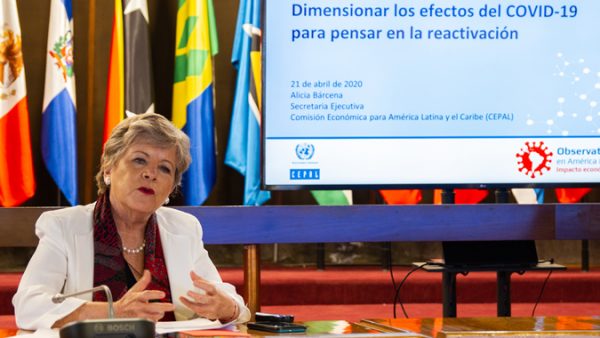
The United Nations Economic Commission for Latin America and the Caribbean (ECLAC) has released dire growth projections for the region. A -5.3% drop is forecast, according to the report published on Tuesday, 21 April 2020. The Dominican Republic is listed as the country to fare the best in 2020, with a 0% growth rate. This is down from 5.5% in 2019.
ECLAC said to find a contraction of this magnitude would mean going back to the Great Depression in 1930, when there was a -5.0% drop, or 1914, when growth plummeted -4.9%.
“The effects of Covid-19 will cause the biggest recession that the region has suffered since 1914 and 1930. A sharp increase in unemployment is forecast, with negative effects on poverty and inequality”, ECLAC chief Alicia Bárcena said during a virtual press conference from its headquarters in Santiago, Chile.
The report, “Assessing the Effects of Covid-19 to Plan the Recovery”, is ECLAC’s second study tracking the economic and social effects of the coronavirus crisis in Latin American and Caribbean countries. The first was issued earlier this month.
Central American countries will experience a -2.3% decline due to reduced economic activity in the United States, which is both a main trading partner and remittance source. Meanwhile, the Caribbean will see a -1.5% drop brought on by decreased demand for tourism services.
The Dominican Republic is part of the Central American bloc of nations and is listed to fare the best in the region, with 0% growth. Growth for Central American countries according to ECLAC in 2020 is: Costa Rica (-3.6%), Cuba (-3.7%), El Salvador (-3%), Guatemala (-1.3%), Honduras (-2.8%), Nicaragua (-5.9%), Panama (-2%).
Prior to the pandemic, the region had reported nearly seven years of low growth, averaging less than 0.5 per cent. The impacts of Covid-19 include a reduction in international trade, falling commodity prices, lower demand for tourism services and a drop in remittances, sent home from workers abroad.
“To have an impact in the new global economy, the region must move towards greater regional integration in terms of production, trade and technology,” Bárcena advised.
“Our countries’ coordination on macroeconomic and production matters is crucial for negotiating the terms of the new normal, particularly with regard to an urgent aspect of the current crisis and in the medium term: the issue of financing for a new development pattern with equality and environmental sustainability.”
Read more in Spanish:
ECLAC
23 April 2020

